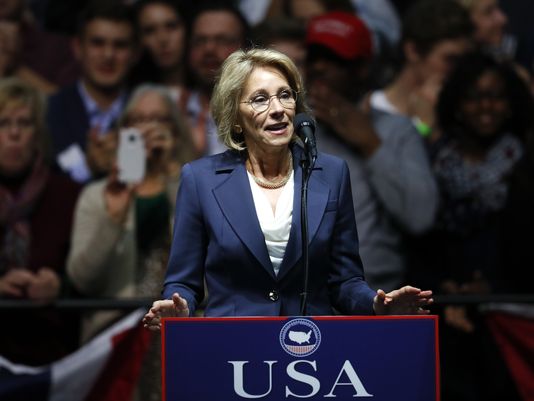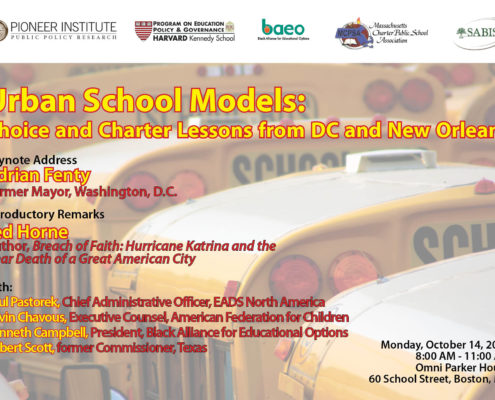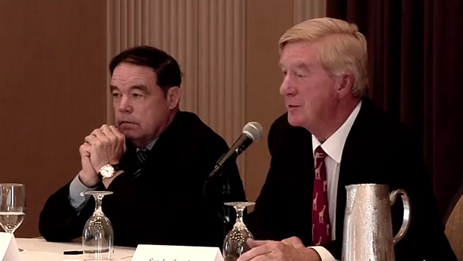Op-ed: Will DeVos avoid the Beltway education trap?
By Jim Stergios and Charles Chieppo
Read this op-ed online at USA Today.
Education nominee could improve on past secretaries by backing state and local innovation.
Every administration since President George H.W. Bush’s has pinned its hopes of transforming American K-12 education on several thousand bureaucrats in the Lyndon B. Johnson Building in Washington, D.C. and the Beltway lobbyists perched on their doorstep. Betsy DeVos, president-elect Donald Trump’s nominee to head the Education Department, needs a different plan.
Given that the federal government contributes approximately 10% of the total spending in the nation’s sprawling, decentralized landscape of 100,000 public K-12 schools, it is neither plausible nor desirable that an Education secretary chase the chimera of a transformational national education policy.
Arne Duncan’s seven years as President Obama’s secretary of Education were just the latest iteration of a muscular federal role in K-12 policy. The administration aggressively pushed a school turnaround initiative, as well as Common Core and national testing consortia, through grants, legally questionable waivers from federal regulations, coordination with philanthropies, and alignment with lobbyists.
The oxymoronic goal was to get states to adopt federally defined, one-size-fits-all approaches to school “innovation.”
As the 2015 results from the National Assessment of Educational Progress demonstrate, taxpayers spent tens of billions of dollars annually on “federal innovation” without improving the academic performance of our public schools. Just-released scores from the Trends in International Math and Science Study assessment show that, again, the U.S. was a below-average performer. Since 2009, our scores have also declined on the international PISA test.
Duncan’s experience hardly differs from that of his predecessors, and that should impart an important lesson to Trump’s incoming education secretary: Policies hatched by the federal government and its inside-the-Beltway partners like the National Governors Association, Council of Chief State School Officers, the Fordham Institute, and Achieve, Inc. have failed repeatedly, and at great taxpayer expense.
A better path for DeVos is to support state and local innovation and state policies that boost opportunity and student achievement.
The incoming secretary is an avowed charter public school advocate. Her advocacy should be shaped by results. Lax rules for determining who can open a school are among the reasons why charters in her home state of Michigan perform only slightly better than the traditional public schools there.
She would do well to advocate for an approach like what is used in Massachusetts. There, a rigorous authorization process and strict oversight, under which schools that don’t live up to the terms of their charter are shuttered, has yielded outstanding performance. A number of urban charter schools have posted some of the best scores in Massachusetts (which has the nation’s highest-performing public schools) on state tests. A Stanford University study found that Boston charters outperform other groups of public schools in the country in closing the achievement gap.
DeVos should also use the bully pulpit to make the case against so-called state anti-aid amendments and laws that prevent public money from flowing to private and religious school families. If she pairs this initiative with targeted changes to the federal tax code that give tax credits for educational expenditures, DeVos could open up new high-quality educational options for low-income households.
Despite consistently outperforming their public counterparts, Catholic schools have suffered from changing demographics and rising labor costs. The number of U.S. students enrolled in them has dropped from 5 million to 2 million over the past 50 years. Allowing public money to follow low-income students to parochial schools would benefit both students and the schools.
When it comes to the national K-12 English and math standards known as Common Core, DeVos has undergone a post-nomination conversion. Upon appointment, she announced “I am not a supporter — period.” Let’s hope that is true. The D.C.-driven Common Core standards reflect a view of public education as just another workforce development program. Research and data show that focusing on academic content and the liberal arts produces both better citizens and more skilled workers.
DeVos should stop support for the federal consortia that are developing Common Core-based tests. Instead, she should encourage the highest-performing states and those that had shown significant improvement to share their standards-based success stories with other states. These include California, Massachusetts, Minnesota, Indiana and Texas, which previously had developed academic standards far superior to Common Core.
The federal education department should also curb the collection of non-academic student data. Oddly, Duncan went so far as to dabble in monitoring students’ “beliefs, attitudes, dispositions, values” and self-perceptions and the measurement of non-cognitive “psychological resources.” DeVos would be wise to revisit the 2013 amendments that gutted the federal Family Educational Rights and Privacy Act and the faddish “social emotional learning” provisions promoted by the Every Student Succeeds Act signed last year by Obama.
DeVos will face constant pressure to expand her school reform portfolio outside the limited areas where she can succeed; that’s the nature of D.C.-based education policymakers and lobbyists. If she surrenders, she will once again set American education on a path of mediocrity and decline. However well-intentioned Beltway bureaucrats and lobbyists may be, DeVos needs to understand that the best school innovation comes from states, localities, and parents.
Jim Stergios is Executive Director and Charles Chieppo is a senior fellow at the nonpartisan Pioneer Institute, a Boston-based think tank.















